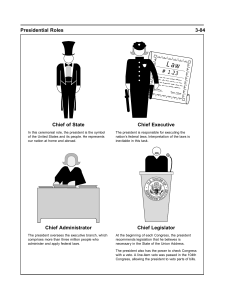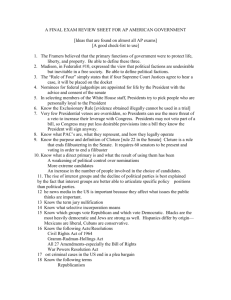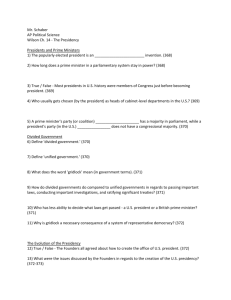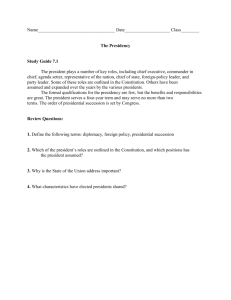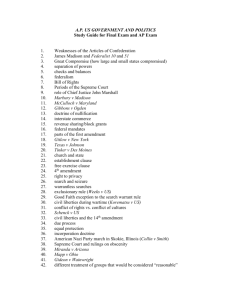American Government and Organization
advertisement
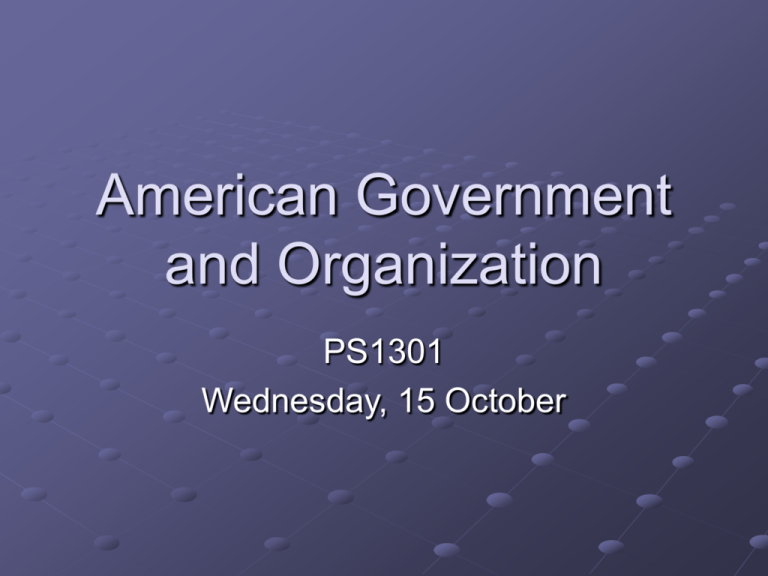
American Government and Organization PS1301 Wednesday, 15 October Review Sources of Presidential Power Constitutional powers Political powers (ie. Presidential popularity) Partisan Basis of Support Presidential influence on congressional elections is limited Divided vs. Unified Government National Politics in Congressional Elections In general, congressional candidates are advantaged when their presidential candidate wins. Today, presidents may have shorter coattails (metaphor for the capacity of a successful presidential candidate to pull the party's other candidates into office) than they did in the nineteenth century, but they are still significant. Gains and Losses in Congress Presidential Election Years Gains and Losses in Congress Midterm Elections Midterm Losses National Politics in Congressional Elections The president's party almost always loses congressional seats. Size of its losses depends in part on the performance of the national economy and the president. Losses are fewer if the economy is strong and the president is popular. Although the Democrats lost seats in 1994, they actually gained seats -- against many predictions -- in 1998. Clinton's public approval rating was 20 points higher and the economy was booming in 1998. Republicans gained seats in 2002 election, took control of Senate Presidential-Congressional Relations If presidents do not have much influence on who is elected to congress how can they influence members of congress? Presidential Success in Congress Electoral Cycle How often the president won on roll call votes on which he took a clear position. Unified versus Divided Control of Government When presidents find their party in majority control of the House and Senate, they have excellent prospects for passing their legislative agenda. Examples: New Deal and Great Society. However, during divided government (when the president’s opposition party controls either or both legislative chambers), the president confronts majorities with different preferences. Divided Control of Government is More Common During the past half century, unified party control has occurred less frequently than divided government. How do presidents deal with this situation? pull decisions into the White House carefully screen appointees to federal agencies utilize the veto go public (engaging in intensive public relations to promote their policies to voters). How Popularity Can Influence a President’s Own Party Members Influence on President’s own party members Policy agreement Successful president helps party Small favors (ie. fundraisers, photo op) Lack of Influence No sanctions Little personal contact between president and rank and file members Different constituencies How Popularity Can Influence the Opposition Opposition party can substantially increase support (1/3rd of total support) Who gets credit? Presidents may behave differently (less willing to compromise?) Popularity—Going public Going Public Presidents and members of Congress share constituencies – to some extent If the president can win the public’s backing for himself and his policies, opponents in Congress may shrink from a fight because they do not want to offend voters. How can a president “go public”? Going Public Today, presidents spend a great deal of their time, energy, and staff taking their message to the American people. Going on prime-time television. Mass communication has expanded and eroded the president’s command of the air waves. How? Public speeches, travel. Success over periods of divided and unified government The President As Legislator: The Veto Perhaps the president’s most formidable tool in dealing with Congress is the veto. Constitution defines the veto precisely. Used relatively rarely – most used by Gerald Ford. In the past 50 years, the average is fewer than 10 vetoes a year. The veto allows the president to block congressional action, but does not allow the president to substitute his own policy preferences. Quiz: 1. The ability of a successful presidential candidate to pull the party's other candidates into office is known by the common metaphor 2. Which party has the majority of seats in the House?



